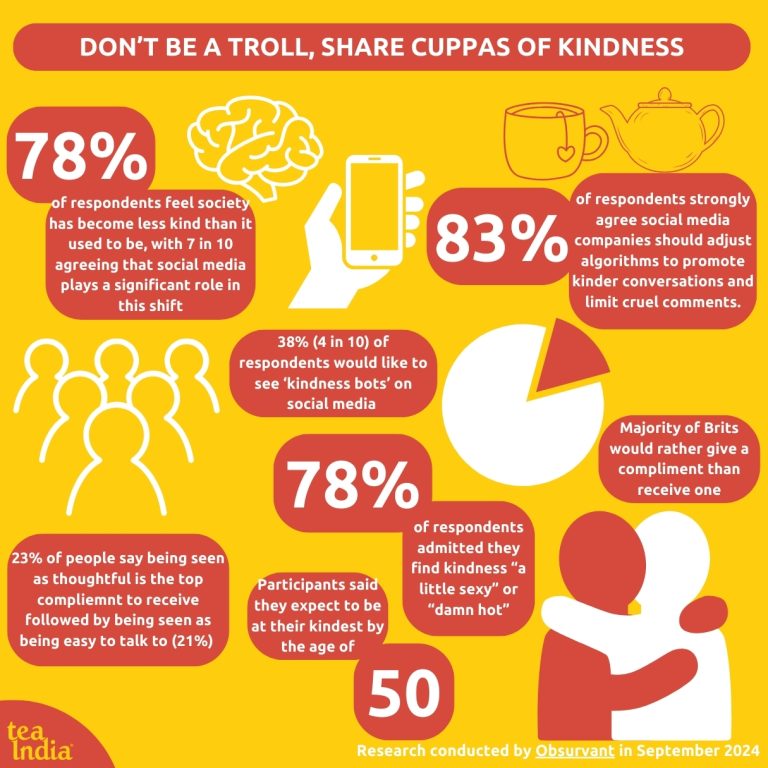Rise of Online Negativity
Trolls, bots, and bot farms have increasingly taken over social media platforms, representing the more negative side of the online world. These entities seem to thrive on spreading misinformation, causing division, and provoking anger or distress.
Research released today by chai brand Tea India indicates that the overwhelming majority of people (78%) feel that society has become less kind than in the past. Seven in 10 respondents (70%) specifically identified social media platforms as key contributors to this shift in societal attitudes.
Calls for Kinder Algorithms
In an era where online comments are frequently harsh and harmful, a striking 83% of survey participants believe social media companies should alter their algorithms to promote kinder conversations and limit the visibility of negative comments. This could help foster a more constructive and positive digital environment.
Furthermore, 38% of respondents expressed interest in the introduction of ‘kindness bots’—digital tools that could counteract the negativity online and spread goodwill. Much like offering a comforting cup of tea to someone in need, these bots could serve to uplift and create a friendlier atmosphere on social media platforms.
Government Involvement Urged
The survey results also highlighted strong support for government intervention. Nearly two-thirds (66%) of respondents believe legislation should be introduced, requiring social media companies to adapt their algorithms to encourage more kindness and less cruelty in online interactions.
Naomi McCann, Marketing Manager at Tea India, explained the motivation behind the survey: “A warm cup of tea is often a symbol of hospitality and kindness, and we hope to bring that same sentiment to our interactions, whether online or in person.”
She added: “People are clearly tired of constant ‘bad bot’ activity online. If we can have bad bot farms spreading negativity, why can’t we have good bot farms promoting kindness and positive stories? Social media companies should be doing more to prioritise harmony and positivity.”
Kindness as an Attractive Trait
The survey also delved into public perceptions of kindness, with 78% of people admitting they find kindness “a little sexy” or even “damn hot.” The quality people most want to be known for is being thoughtful (23%), followed closely by being easy to talk to (21%).
Interestingly, the majority of respondents said they would rather give a compliment than receive one. On average, they placed a monetary value of £26.46 on being told they look good, reflecting how much people appreciate positive feedback.
Participants also reported expecting to reach their peak kindness around the age of 50, indicating that empathy and compassion may increase with age and experience.
The Impact of Social Media on Empathy
Neuroscientist Nicole Vignola shared her insights on the findings: “People clearly feel that social media is reducing our capacity for kindness, with a large proportion of respondents urging governments to step in and regulate the algorithms.”
She continued: “Anonymity online can lead to dehumanisation, making it easier for individuals to behave unkindly, without understanding the consequences of their words. The rise in screen-based communication also reduces our ability to interpret important non-verbal cues, like eye contact or body language, which are essential for developing empathy.”
Vignola concluded: “Even small acts of kindness, such as making someone a cup of tea the way they like it, can go a long way in building connections and demonstrating empathy. Kindness is simple and can be practised daily, both online and offline.”


